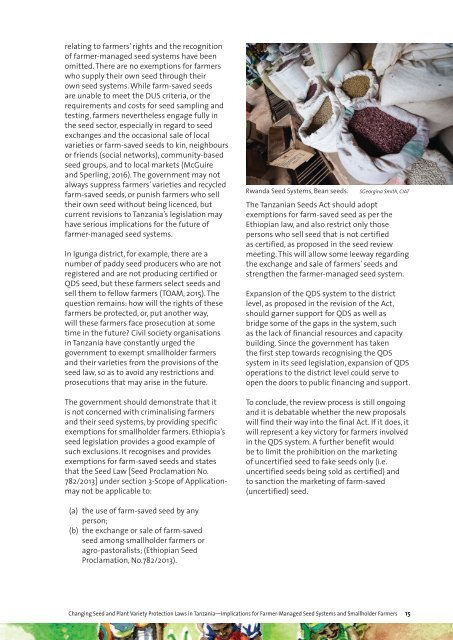Changing Seed and Plant Variety Protection Laws in Tanzania—
Tanzania-Seed-Law-2016
Tanzania-Seed-Law-2016
You also want an ePaper? Increase the reach of your titles
YUMPU automatically turns print PDFs into web optimized ePapers that Google loves.
elat<strong>in</strong>g to farmers’ rights <strong>and</strong> the recognition<br />
of farmer-managed seed systems have been<br />
omitted. There are no exemptions for farmers<br />
who supply their own seed through their<br />
own seed systems. While farm-saved seeds<br />
are unable to meet the DUS criteria, or the<br />
requirements <strong>and</strong> costs for seed sampl<strong>in</strong>g <strong>and</strong><br />
test<strong>in</strong>g, farmers nevertheless engage fully <strong>in</strong><br />
the seed sector, especially <strong>in</strong> regard to seed<br />
exchanges <strong>and</strong> the occasional sale of local<br />
varieties or farm-saved seeds to k<strong>in</strong>, neighbours<br />
or friends (social networks), community-based<br />
seed groups, <strong>and</strong> to local markets (McGuire<br />
<strong>and</strong> Sperl<strong>in</strong>g, 2016). The government may not<br />
always suppress farmers’ varieties <strong>and</strong> recycled<br />
farm-saved seeds, or punish farmers who sell<br />
their own seed without be<strong>in</strong>g licenced, but<br />
current revisions to Tanzania’s legislation may<br />
have serious implications for the future of<br />
farmer-managed seed systems.<br />
In Igunga district, for example, there are a<br />
number of paddy seed producers who are not<br />
registered <strong>and</strong> are not produc<strong>in</strong>g certified or<br />
QDS seed, but these farmers select seeds <strong>and</strong><br />
sell them to fellow farmers (TOAM, 2015). The<br />
question rema<strong>in</strong>s: how will the rights of these<br />
farmers be protected, or, put another way,<br />
will these farmers face prosecution at some<br />
time <strong>in</strong> the future? Civil society organisations<br />
<strong>in</strong> Tanzania have constantly urged the<br />
government to exempt smallholder farmers<br />
<strong>and</strong> their varieties from the provisions of the<br />
seed law, so as to avoid any restrictions <strong>and</strong><br />
prosecutions that may arise <strong>in</strong> the future.<br />
The government should demonstrate that it<br />
is not concerned with crim<strong>in</strong>alis<strong>in</strong>g farmers<br />
<strong>and</strong> their seed systems, by provid<strong>in</strong>g specific<br />
exemptions for smallholder farmers. Ethiopia’s<br />
seed legislation provides a good example of<br />
such exclusions. It recognises <strong>and</strong> provides<br />
exemptions for farm-saved seeds <strong>and</strong> states<br />
that the <strong>Seed</strong> Law [<strong>Seed</strong> Proclamation No.<br />
782/2013] under section 3-Scope of Applicationmay<br />
not be applicable to:<br />
Rw<strong>and</strong>a <strong>Seed</strong> Systems, Bean seeds.<br />
SGeorg<strong>in</strong>a Smith, CIAT<br />
The Tanzanian <strong>Seed</strong>s Act should adopt<br />
exemptions for farm-saved seed as per the<br />
Ethiopian law, <strong>and</strong> also restrict only those<br />
persons who sell seed that is not certified<br />
as certified, as proposed <strong>in</strong> the seed review<br />
meet<strong>in</strong>g. This will allow some leeway regard<strong>in</strong>g<br />
the exchange <strong>and</strong> sale of farmers’ seeds <strong>and</strong><br />
strengthen the farmer-managed seed system.<br />
Expansion of the QDS system to the district<br />
level, as proposed <strong>in</strong> the revision of the Act,<br />
should garner support for QDS as well as<br />
bridge some of the gaps <strong>in</strong> the system, such<br />
as the lack of f<strong>in</strong>ancial resources <strong>and</strong> capacity<br />
build<strong>in</strong>g. S<strong>in</strong>ce the government has taken<br />
the first step towards recognis<strong>in</strong>g the QDS<br />
system <strong>in</strong> its seed legislation, expansion of QDS<br />
operations to the district level could serve to<br />
open the doors to public f<strong>in</strong>anc<strong>in</strong>g <strong>and</strong> support.<br />
To conclude, the review process is still ongo<strong>in</strong>g<br />
<strong>and</strong> it is debatable whether the new proposals<br />
will f<strong>in</strong>d their way <strong>in</strong>to the f<strong>in</strong>al Act. If it does, it<br />
will represent a key victory for farmers <strong>in</strong>volved<br />
<strong>in</strong> the QDS system. A further benefit would<br />
be to limit the prohibition on the market<strong>in</strong>g<br />
of uncertified seed to fake seeds only (i.e.<br />
uncertified seeds be<strong>in</strong>g sold as certified) <strong>and</strong><br />
to sanction the market<strong>in</strong>g of farm-saved<br />
(uncertified) seed.<br />
(a) the use of farm-saved seed by any<br />
person;<br />
(b) the exchange or sale of farm-saved<br />
seed among smallholder farmers or<br />
agro-pastoralists; (Ethiopian <strong>Seed</strong><br />
Proclamation, No.782/2013).<br />
<strong>Chang<strong>in</strong>g</strong> <strong>Seed</strong> <strong>and</strong> <strong>Plant</strong> <strong>Variety</strong> <strong>Protection</strong> <strong>Laws</strong> <strong>in</strong> <strong>Tanzania—</strong>Implications for Farmer-Managed <strong>Seed</strong> Systems <strong>and</strong> Smallholder Farmers 15


